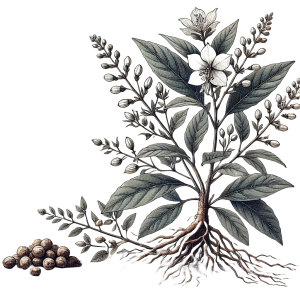SCIENCE | SUPPLEMENTS
Ashwagandha
Ashwagandha (Withania somnifera) is a traditional Ayurvedic herb known for its adaptogenic properties, which help reduce stress and promote overall well-being. It is often used to enhance physical performance, improve cognitive function, and support the immune system. The herb is available in various standardized extracts like Sensoril®, KSM-66®, and Shoden®, which are used in supplements for their therapeutic benefits.

Recent studies highlight the diverse therapeutic potential of Ashwagandha (Withania somnifera). A systematic review and meta-analysis revealed that Ashwagandha significantly reduces anxiety and stress levels, with the most pronounced effects at doses between 300-600 mg/day of Ashwagandha extract (Phytother Res. 2022). It also improves sleep quality and quantity, particularly in adults with insomnia, when taken at higher dosages (≥600 mg/day) for at least 8 weeks, using Ashwagandha root extract (PLoS One. 2021). In terms of physical performance, Ashwagandha enhances VO2max and significantly improves upper and lower-body strength, body composition, and recovery in recreationally active men over a 12-week period with 500 mg/day of Sensoril®, a standardized aqueous extract of Ashwagandha (Nutrients. 2020, Nutrients. 2018). Additionally, it reduces anxiety and stress by moderating the hypothalamus-pituitary-adrenal axis, as evidenced by reductions in cortisol and DHEA-S levels with a 240 mg/day dose of standardized Ashwagandha extract (Shoden) (Medicine (Baltimore). 2019). In subclinical hypothyroid patients, Ashwagandha root extract at 600 mg/day effectively normalizes serum TSH, T3, and T4 levels over an 8-week period (J Altern Complement Med. 2018). These findings suggest Ashwagandha’s broad health benefits, warranting further research to substantiate these results and explore long-term safety.
PUBLICATIONS
-
Does Ashwagandha supplementation have a beneficial effect on the management of anxiety and stress? A systematic review and meta-analysis of randomized controlled trials.
-
-
-
- Phytother Res. 2022 Nov;36(11):4115-4124.
- Design: Systematic review and meta-analysis of randomized controlled trials (RCTs) investigating Ashwagandha extract on anxiety and stress.
- Summary: Ashwagandha supplementation significantly reduced anxiety (SMD: -1.55, 95% CI: -2.37, -0.74; p = .005; I2 = 93.8%) and stress levels (SMD: -1.75; 95% CI: -2.29, -1.22; p = .005; I2 = 83.1%) compared to placebo. Non-linear dose-response analysis indicated a favorable effect of Ashwagandha on anxiety up to 12,000 mg/d and stress at doses of 300-600 mg/d. The certainty of the evidence was low for both outcomes.
-
-
-
- Effect of Ashwagandha (Withania somnifera) extract on sleep: A systematic review and meta-analysis.
-
-
-
- PLoS One. 2021 Sep 24;16(9):e0257843.
- Design: Systematic review and meta-analysis of RCTs examining the effect of Ashwagandha extract on sleep.
- Summary: Ashwagandha extract exhibited a small but significant effect on overall sleep (SMD -0.59; 95% CI -0.75 to -0.42; I2 = 62%). The effects were more prominent in adults with insomnia, dosage ≥600 mg/day, and treatment duration ≥8 weeks. Improvements were also observed in mental alertness on rising and anxiety levels, but not in quality of life. No serious side effects were reported.
-
-
-
- Effects of Ashwagandha (Withania somnifera) on VO2max: A Systematic Review and Meta-Analysis.
-
-
-
- Nutrients. 2020 Apr 17;12(4):1119.
- Design: Systematic review and meta-analysis of RCTs investigating the effects of Ashwagandha on maximum oxygen consumption (VO2max).
- Summary: Ashwagandha supplementation significantly enhanced VO2max in healthy adults and athletes (p = 0.04). The mean difference was 3.00 (95% CI from 0.18 to 5.82) with high heterogeneity. Further research is needed to confirm these findings due to the limited number of studies and high heterogeneity.
-
-
-
- An investigation into the stress-relieving and pharmacological actions of an ashwagandha (Withania somnifera) extract: A randomized, double-blind, placebo-controlled study.
-
-
-
- Medicine (Baltimore). 2019 Sep;98(37):e17186.
- Design: A 60-day randomized, double-blind, placebo-controlled study on the effects of Ashwagandha on stress and anxiety in adults with self-reported high stress.
- Summary: Ashwagandha supplementation significantly reduced Hamilton Anxiety Rating Scale (HAM-A) scores (P = .040) and Depression, Anxiety, and Stress Scale -21 (DASS-21) scores (P = .096) compared to placebo. It was also associated with greater reductions in morning cortisol and DHEA-S levels. Testosterone levels increased in males but not females. These findings suggest Ashwagandha’s stress-relieving effects may occur via its moderating effect on the hypothalamus-pituitary-adrenal axis.
-
-
-
- Effects of an Aqueous Extract of Withania somnifera on Strength Training Adaptations and Recovery: The STAR Trial.
-
-
-
- Nutrients. 2018 Nov 20;10(11):1807.
- Design: Double-blind, randomized, placebo-controlled study on the effects of Sensoril®, a standardized aqueous extract of Ashwagandha, on strength training adaptations in recreationally active men.
- Summary: Supplementation with 500 mg/d of Sensoril® significantly improved upper and lower-body strength, supported a favorable distribution of body mass, and was well tolerated clinically over a 12-week resistance training period. Gains in 1-RM squat and bench press were significantly greater in the Sensoril® group compared to placebo. Improvements were also noted in average squat power, peak bench press power, 7.5 km time trial performance, and perceived recovery scores.
-
-
-
- Efficacy and Safety of Ashwagandha Root Extract in Subclinical Hypothyroid Patients: A Double-Blind, Randomized Placebo-Controlled Trial.
-
-
-
- J Altern Complement Med. 2018 Mar;24(3):243-248.
- Design: Double-blind, randomized, placebo-controlled study on the efficacy and safety of Ashwagandha root extract in subclinical hypothyroid patients.
- Summary: Treatment with 600 mg daily of Ashwagandha root extract significantly improved serum TSH, T3, and T4 levels compared to placebo. Ashwagandha effectively normalized serum thyroid indices over an 8-week period with few mild and temporary adverse effects reported.
-
-
-

